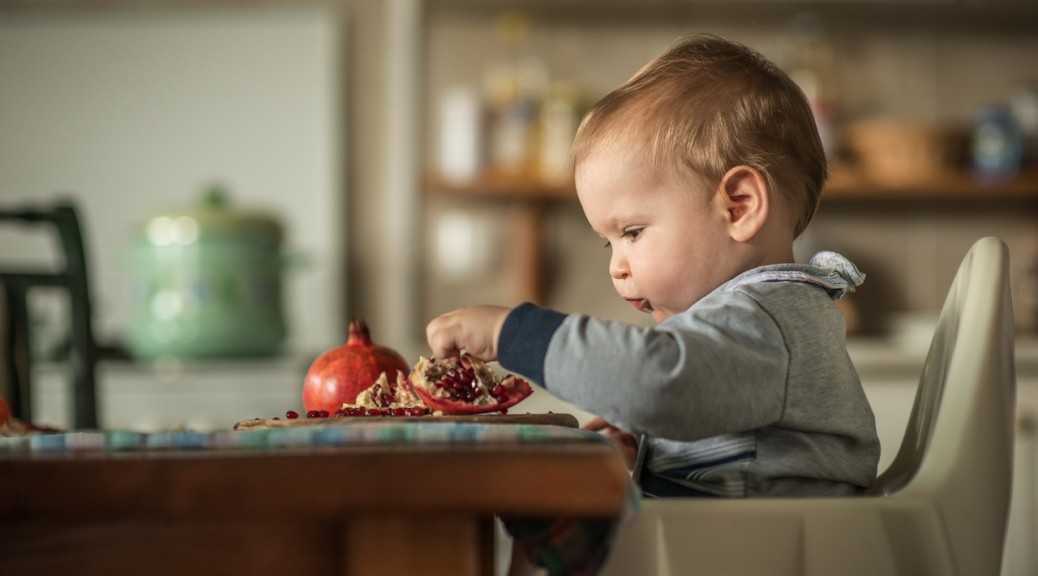Sophie Tippins is a Dubai-based British Clinical Registered Dietitian who has worked with the NHS Trust in the UK and in the private sector in Abu Dhabi with both adults and children. She also is co-founder of the Wholesprog, and you can follow her on Facebook or Instagram for more healthy food ideas for families.
You would assume that as a dietitian, I breezed through weaning my daughter with no trepidation and no rushed trips to the paediatrician. This wasn’t the case. Like most parents the idea of weaning filled me with both welcomed excitement, as well as the inevitable fear & confusion that come with this important stage of your child’s development.
A recent survey by Beechnut confirmed that I am not alone. A majority of parents, 54% of those they asked, were also confused with weaning.
To help eliminate some of the confusion here is some guidance on weaning your little one from Whole Sprog.
When to wean
It is important not to introduce solids before 17 weeks as before this, little ones bodies’ are not ready. However, if after 17 weeks your baby is showing the development signs listed below then you can happily start weaning.
#can sit upright with little support
#able to hold their head up
#picking up toys and putting them in their mouth
#when you offer your baby food they don’t immediately push it out with their tongue (tongue-thrust reflex)
There is a five-week gestational age range of term babies (born between 37 and 42 weeks gestation) with every baby growing and developing at different rates. This means some infants will be ready to begin weaning at an earlier age than others. So watch your own baby for the above signs and try not to worry what other babies are doing! At 6 months your baby needs more iron and nutrients than milk alone can provide, so babies should start weaning no later than 6 months.
What to wean with
Irrespective of when you introduce solid foods, it is important to start with low allergenic foods (foods least likely to cause an allergic reaction).
First foods
#Root vegetables e.g. carrot, swede, sweet potato, parsnip, potato, yam
#Fruits e.g. apple, pear, banana, plum, peach, apricot, avocado
#Spinach, broccoli, green beans, courgette, cauliflower, butternut squash
After your little one has got used to eating some of these foods, you can combine with pureed lentils or pulses or puréed meats and poultry. These foods are high in the mineral iron which your baby needs to start getting from their diet from 6 months onwards.
These foods can be introduced from 6 months
#Cow’s milk (not as a drink), cheese
#Eggs, wheat, rye barley, soya
#Fish, shellfish
#Peanuts, tree nuts, seeds (avoid whole nuts until 5years)
#Citrus fruits
All new foods should be introduced one at a time, with a gap of 3 days in between each new food. This makes it easier to identify any foods that may cause a reaction. Normally reactions in the first instance tend to be minor, such as red blotching on the face or neck.
Foods that should be avoided before 12 months
#Honey
#Soft or uncooked eggs
#Animal milk or alternative milks as a drink (rice milk shouldn’t be introduced until after 5 ½ years)
How to wean
Baby led or spoon fed? We say both!
In reality most parents will do a bit of both. It’s also likely the second, third, fourth child tends to do more ‘baby led weaning’ due to the fact that mummy is super busy and can’t give the same undivided attention that baby number 1 gets (guilty mum feeling sets in!).
When your baby is just starting their weaning adventure, offer them tastes about an hour after a milk feed around mid-day. That way they are not ravenous, but hungry enough to be curious. This also enables you to access medical help if in the worst case scenario, your little one has a severe allergic reaction.
Some final tips based on the evidence…
#Moving from puree to lumps. Some babies are kept on smooth foods for too long and those who are not offered lumps and finger foods by 9 months are more likely to be fussy eaters. After a couple of weeks on pureed foods you can move to a mashed texture.
#Drinking water. From 6 months when your baby is eating, offer a few sips of water from a free flowing sippy cup. Your baby may not even drink initially. But having the cup out will allow baby to become familiar with it and eventually they will be happily drinking.
#It doesn’t have to be boring. Babies, as we do, will enjoy a variety of flavours. Once you have added a few first tastes into their repertoire be adventurous and add herbs and spices to develop their palette.
#Interesting research shows that babies who are weaned on vegetables and continue to enjoy them are less likely to have a ‘sweet tooth’.
#Don’t take your baby’s facial expressions for not liking a food. Babies make all sorts of funny faces when trying new foods.
For more tips and advice on healthy weaning and food adventures, you can follow the Whole Sprog team on instagram/wholesprog or Facebook.
Sophie has a clinic at Up and Running Sports Integrated Medical Centre, Al Wasl Rd Umm Suqeim 2

